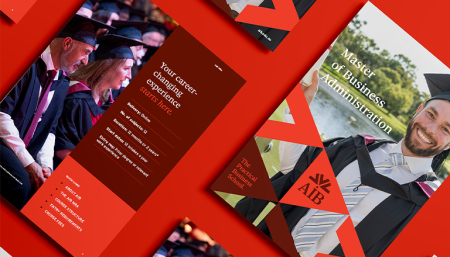3 ways how the AIB MBA will better your communication skills

As a student of the Master of Business Administration (MBA), there is no doubt that you will gain a wide range of new skills throughout your journey. During the Fast-Track MBA you will be constantly acquiring knowledge, putting it into practice and engaging with your fellow students and the teaching staff. From broad leadership skills, to technical skills in specialised areas – no other degree will give you such a holistic understanding of business.
Aspiring leaders can particularly benefit from the improvements in their communication skills as a result of studying an MBA.
Does the MBA teach you how to improve your communication skills?
Whilst communication is not a specific subject covered throughout the program, undertaking the Fast-track MBA will improve your communication skills greatly. As in business, students must be able to communicate, advocate and influence effectively throughout the MBA. The program provides ample opportunities to sharpen both written and verbal communication skills through practice in settings that can be applied to real-world scenarios.
From an increased ability to articulate yourself through to improved public speaking skills – the following three ways are areas in which your communication skills will benefit most from an MBA.
Verbal communication: group-based projects
Group-based projects may not be essential in every course, but they play a significant role in the learning outcomes for both on-campus and distance learning students. Whether it is working in a group environment in person, or working as a group in an online forum – there are some fantastic communication skills to be learnt and honed.
Group work allows you to improve on articulating and relaying your ideas, work on your listening and reading skills, as well as better the way in which you communicate with peers. Although students usually dread group-based projects, they are actually one of the most beneficial ways to work – and for many of the same reasons that students tend to dread them
Achieving successful outcomes with a group of equal peers involves communication skills absolutely crucial in comparable business settings. These skills include:
- Negotiating and delegating responsibility.
- Resolving conflict.
- Consensus building.
- Positive persuasion and influence.
Finally, learning these skills throughout your degree will only assist you in the workplace, as you are bound to work in a team environment for much of your career.
Written communication: regular essay writing
The continuous practice of essay writing throughout your AIB MBA will improve your communication skills more than you know. Written communication makes up a lot of our roles in the business world, therefore it is an invaluable skill to possess. From writing professional emails, to creating pitch documents or contracts – a high level of written communication will always be an asset.
In business, leaders must often be able to distil complex information into forms that can guide decisions and instigate action. Essay-writing is vital practice for this essential skill.
Throughout the MBA, the vast majority of subjects will see you write an essay or research-based project. The process of continually researching, outlining, drafting and writing essays forces students to communicate complex ideas clearly, logically and concisely. While improving your ability to convey your points, you will also learn to write succinctly and with purpose as you discuss practical business theories and findings.
Conducting research for essays – and for group-based projects – also helps with another under-recognised communication skill: the ability to understand complex information that is presented to you. Communication is a two-way process, encompassing more than just the ability to convey. Those who are better able to take in information will be among the most successful communicators.
Real-stakes communication: work-applied learning approach
Work-applied learning is a unique approach by AIB that sees students deliver hands-on solutions to real-world business issues. A combination of theory and practice, the model allows students to tackle issues head on, and prepares them for the practical business world that awaits.
Using this learning approach, the MBA will improve your communication skills as you become more confident in approaching these issues and can convey your ideas with ease. If the program was purely theory, students would know what to do, but would struggle in applying these skills or communicating these ideas in real-world business contexts.
This approach ensures students are equipped with a practical learning experience, and have no issue implementing their knowledge professionally and with confidence.
Improving your communication skills is just one reason to study an MBA
An MBA can help graduates improve many soft skills beyond communication that make them more desirable to employers and more effective as leaders. These improvements, paired with the knowledge and experience that graduates gain – and can begin applying to their career immediately – are among the reasons to choose a program like the Fast-Track MBA.





